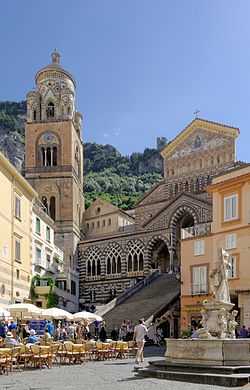Roman Catholic Archdiocese of Amalfi-Cava de' Tirreni
| Archdiocese of Amalfi-Cava de' Tirreni Archidioecesis Amalphitana-Cavensis | |
|---|---|
 | |
| Location | |
| Country | Italy |
| Ecclesiastical province | Salerno-Campagna-Acerno |
| Statistics | |
| Area | 150 km2 (58 sq mi) |
| Population - Total - Catholics |
(as of 2006) 103,351 102,700 (99.4%) |
| Parishes | 76 |
| Information | |
| Denomination | Catholic Church |
| Rite | Roman Rite |
| Established | 6th Century |
| Cathedral | Cattedrale di S. Andrea Apostolo |
| Current leadership | |
| Pope | Francis |
| Archbishop | Orazio Soricelli |
| Website | |
| www.diocesiamalficava.it | |
The Archdiocese of Amalfi-Cava de' Tirreni (Latin: Archidioecesis Amalphitana-Cavensis) is a Roman Catholic archbishopric, which has its archiepiscopal see at Amalfi, not far from Naples. It was named Archdiocese of Amalfi until parts of the Diocese of Cava e Sarno were merged with it on September 30, 1986.
It was exempt, i.e. directly dependent on the Holy See, but is now a suffragan of the archdiocese of Salerno-Campagna-Acerno.
The current titular is Orazio Soricelli.
History
The early beginnings of Amalfi are very obscure; it is not known when it was founded, or when Christianity reached it. That it was early is a reasonable conjecture, considering the facilities for communication with the East which the South of Italy possessed.
The first positive indication that Amalfi was a Christian community is supplied by Pope Gregory the Great, who wrote in January 596 to the Subdeacon Antemius, his legate and administrator in Campania, ordering him to constrain within a monastery Primenus, Bishop of Amalfi, because he did not remain in his diocese, but roamed about.[1] The regular list of bishops began in 829.
It was raised to an archbishopric by Pope John XV in 987. In 1206, after the completion of the Cathedral of St. Andrew (Duomo), the relics of the Apostle of that name, who was the patron saint of Amalfi, were taken from Constantinople and brought there by Cardinal Pietro of Capua, an Amalfitan who took part in the sack of Constantinople during the Fourth Crusade.
Notes
Sources and references
 This article incorporates text from a publication now in the public domain: Herbermann, Charles, ed. (1913). Catholic Encyclopedia. Robert Appleton Company.
This article incorporates text from a publication now in the public domain: Herbermann, Charles, ed. (1913). Catholic Encyclopedia. Robert Appleton Company. - GigaCatholic
| ||||||